Last Updated on
Our editors independently research the best products online to produce this list. We may receive commission on purchases made from the links below but this will never affect our product choices.
Top 8 Best Water Softeners
- Water2Buy W2B200 (Editor’s Choice)
- iSpring RCC1UP-AK (Luxury Choice)
- Eddy Electronic Descaler (Best Value)
- iSpring 6-Stage RCC7AK
- Water2Buy W2B110
- BWT WS555
- iSpring RCC7P-AK
- BWT WS455
A water softener is a necessary appliance in most homes. If you don’t have it installed in your house, you have to face clogged pipes, limescale build-up on your pipes and faucet, and stained dishes because of hard water. It could even be worse, and you could have skin irritation or dull hair.
The good news is if you install a water softener in your plumbing system, you don’t have to deal with hard water anymore. In this article, we’ll be reviewing a wide range of products on the market, making it easier for you to find the best water softener in the UK for your needs.
How We Compared Water Softeners
To find the right water softeners we considered multiple factors, including:
- Capacity
- Size
- Regeneration cycles
- Bypass valve
- Multi-purpose
- Warranty
Our editorial team carefully researched and selected products that would suit a wide range of needs to take your kitchen experience to the next level. We set out this list after assessing customer reviews and evaluating pros and cons in line with the above comparison points.
Find more about our behind-the-scenes process here.
Water Softener Reviews
Water2Buy W2B200 (Editor’s Choice)
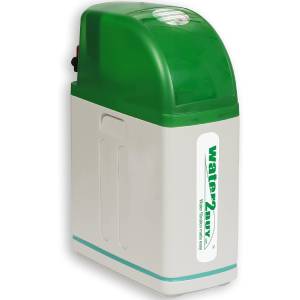
This water softener is designed to produce 1,250 litres of soft water every day; that’s enough for a family of 4 people. It’s made out of a fibreglass and polyethene tank that doesn’t rust or easily deform. If you’re concerned about its size, it should be small enough to fit in your kitchen cupboard.
What’s even more impressive about this water softening system is that it comes with an automatic self-cleaning feature. Besides that, it features a digital meter control that replenishes the salt when necessary. That means there is no softener, salt or water wastage when the device is running.
Another cool thing about it is that it’s pre-fitted with a bypass valve that makes it possible to control hard and soft water flow.
On the downside, this water softener wouldn’t be suitable if you have a large household with high water demand. Then again, who said you couldn’t buy more than one unit?
Pros:
- It features a digital meter control
- Automatic self-cleaning
- Low power consumption
- It comes with a bypass valve
- It doesn’t occupy a lot of space
Cons:
- It might not be ideal be for large households
- It may be fragile
iSpring RCC1UP-AK (Luxury Choice)
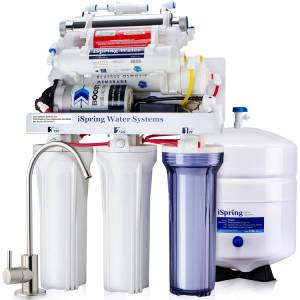
This multi-purpose system doesn’t just soften the hard water but can also purify it and make it safe for drinking. It uses a reverse osmosis filtration system to remove all the impurities such as calcium, fluoride, chlorine, arsenic, lead, sodium, and asbestos from the water.
Once the impurities have been removed, the water is pressurised through an alkaline filter that injects healthy ionised minerals to give it a natural taste. Believe it or not, if you drink filtered water, you won’t differentiate it from bottled mineral water.
The unit comes with a UV filter, pump, water sensor, faucet, and storage tank. The plumbing system installation shouldn’t be a headache if you follow the instructions; you don’t need to connect it directly to a pipe.
However, you can only install this water softener system under the kitchen sink, and it won’t be convenient if you want a device to cover the entire house. Besides that, it may have a lower capacity compared to other types of home water softeners.
Pros:
- 7 stage filtration process
- UV filter to save power
- It can fit under the kitchen sink
- It produces drinking water
- It adds healthy minerals to the water
Cons:
- Low water capacity
- It needs to be regularly maintained
Eddy Electronic Descaler (Best Value)
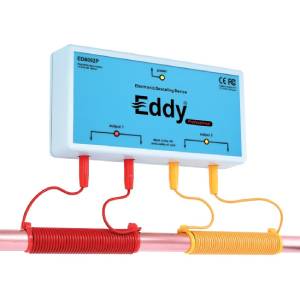
This model is an electric water softener that uses a magnetic field to neutralise the water. Once you activate the magnet, the positive and negative ions will discharge to prevent the minerals in the hard water from building up. Technically, it doesn’t remove the calcium and potassium in hard water, but it can prevent limescale in your pipes, faucet, and showerhead.
It is quite impressive that it doesn’t come with a salt chamber to soften the hard water; that means you don’t need to maintain it regularly. In addition to that, it’s easy to install, and you don’t need to cut the pipes. All you need to do is wrap the magnetic coil around the water pipes and let it do its magic.
Unfortunately, this domestic water softener might not be suitable for softening extremely hard water.
Pros:
- Easy to install
- Eliminates limescale
- It doesn’t use salt
- Lifetime warranty
- Low maintenance
Cons:
- It might not remove the minerals completely
- It may consume a lot of electricity
iSpring 6-Stage RCC7AK
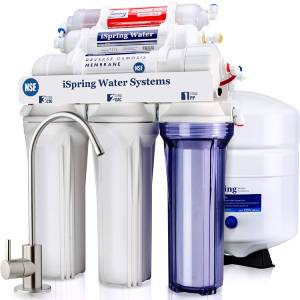
This is another iSpring water softening system, but it’s another alternative. Unlike the other model, this unit is designed to soften and purify the water through 6 stages before it’s ready for consumption. It also relies on reverse osmosis to eliminate 99 per cent of harmful contaminants like calcium, asbestos, lead, chlorine, fluoride, sodium, and arsenic from hard water.
Just to add a little finishing touch, the filtration system adds healthy minerals and balances the water PH to 7 before it comes out of the faucet. In contrast with salt-based water softener, it doesn’t require weekly maintenance. However, you need to replace the filtration pieces after six months.
The holding tank capacity is 2.5 gallons, but it can produce 75 gallons of soft water per day. Talking about the water pressure, this model should be able to handle 45 to 70 PSI at a temperature range of between 40 to 100 degrees Fahrenheit. It can be installed under the kitchen sink, but keep it away from direct sunlight.
Unfortunately, this hard water softener may not be suitable for large-scale households.
Pros:
- It can fit under the sink
- Easy to install
- It purifies drinking water
- Eliminates water odour
- No regeneration required
Cons:
- It might not be suitable for large scale
- It might have a low water capacity
Water2Buy W2B110
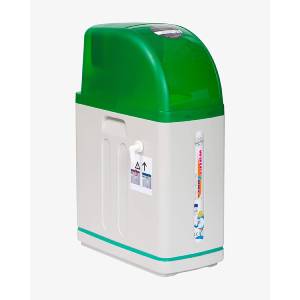
This Water2Buy W2B110 is almost similar to the W2B200 model, although it’s smaller. As a matter of fact, it’s the best compact water softener in the UK; that means you can easily install it in your basement, garage, or kitchen. It also runs on 12v electricity, and you can bet it needs a low power supply.
If you use it, it should be able to soften 1,250 litres of hard water every day; that’s more than enough considering the average household in the UK consumes about 500 litres of water in a single day. Of course, it comes with a bypass valve that lets you access the hard water for your lawn or garden.
What about durability? It’s made out of a polyethene tank and corrosion-resistant fibreglass, so you shouldn’t be worried about its durability. If you’re sceptical, it comes with a 7-year warranty.
Its biggest drawback is that it uses a timer to regenerate the softener salt when it runs out automatically. That means it will automatically replenish the salt even when you’re away from your house. Then again, you can turn it off when you travel.
Pros:
- It can soften 1,250 litres of water
- Made with durable material
- Small and compact design
- Suitable for an average household
- It doesn’t consume too much power
Cons:
- Automatic regeneration time could be wasteful
- It might be fragile
BWT WS555
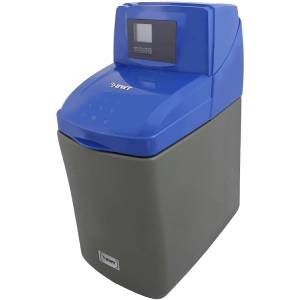
This is a salt-based water softener with a holding capacity of 14 litres. The hard water passes through a cylinder with resin beads that remove calcium and magnesium in exchange for sodium ions. The water softener is regulated by a microprocessor that monitors your consumption and calculates the regeneration cycle; this helps to cut down your salt usage.
When it’s working at full capacity, it should be able to soften 1600 litres of 300 ppm hard water in a day; this makes it ideal for large households. What’s more, the exchange tank is designed to automatically clean and rinse itself on schedule. Better yet, if the salt in the brine tank is too low, the device will beep to remind you to take action.
Our only concern is that the unit might be too bulky; it might not fit in all kitchen cupboards.
Pros:
- It’s easy to install
- Smart water monitoring
- Low salt reminder
- Advanced memory function
- Suitable for large households
Cons:
- It could be bulky for some users
- It might need regular maintenance
iSpring RCC7P-AK
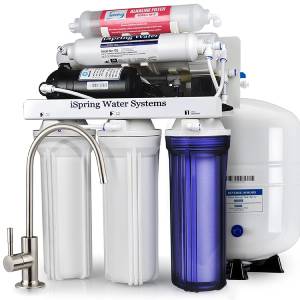
Incredibly, this system can filter hard water with 750 parts per million dissolved solids. If that doesn’t convince you, how about removing 99 per cent of contaminants such as fluoride, magnesium, calcium, lead, and chlorine? The water filtration system is so precise that you can safely drink water directly from the faucet.
As an assurance of quality, this iSpring RCC7P-AK has been certified by the Water Quality Association; this means it has gone through rigorous testing for cycle resistance, pressurisation, and air leaks. What else? The multi-layer reverse osmosis membrane can churn out 75 gallons of soft, clean water daily. Don’t forget the operating water temperature is set between 40 to 100 degrees Fahrenheit.
On the flip side, this is more of a water filter than a water softener, so don’t expect it to produce water for your entire household. However, it’s very effective at softening and purifying extremely hard water.
Pros:
- Easy to install
- It produces safe to drink water
- Ideal for extremely hard water
- Balances the water PH
- Transparent first stage housing
Cons:
- It might not be suitable for an entire household
- It might have a high-waste ratio
BWT WS455
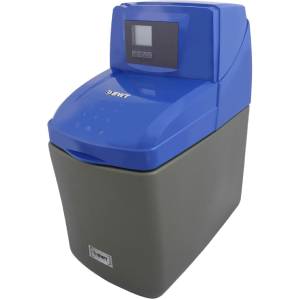
This is another water softener from BWT that you can buy for your kitchen. If you connect it to your stopcock, it will soften your water at a maximum flow rate of 10 litres per minute; this is equivalent to 5 bars of water pressure. On top of that, this compact water softener UK customers can buy comes with a digital control panel that allows you to monitor water and salt consumption.
Better yet, if you run out of block salt and you can’t find a replacement at your local shop, you can still use tablet salt temporarily. If you’ve noticed, this model is smaller than the WS555 variant, but it should be enough to cover a family of four people. Not to mention, if you fill the brine tank with salt, it should last at least six weeks.
How long should you expect it to last? Well, it comes with a five years parts warranty, so you can expect it to last twice as long if you install it in a secure location.
The thing is, we can’t help but try to compare it to its bigger brother, the WS555 model that produces 14 litres per minute. However, this is a smaller alternative if you don’t want a big water softener just for the sake of it.
Pros:
- Low power consumption
- Smart water monitoring
- Electronic control system
- Block tablet salt option
- It’s durable
Cons:
- It might have a low water flow rate
- It might require regular maintenance
Why Install a Water Softener?
You’ve probably heard of hard water, right? We’re not talking about ice but water filled with dissolved minerals such as calcium and magnesium. The problem is hard water can cause scales to accumulate inside your water supply pipes.
Next thing you know, the hard water clogs your pipes and becomes a menace on your dishwasher, shower head, and washing machine in your household. In other words, hard water is like slow cancer on your home appliances that require water to run; it will shorten your devices’ lifespan and increase your household bills.
Besides that, hard water can make your skin dry and itchy. But what if there was a way you could turn that hard water into soft water? Voila! A water softener will remove the dissolved minerals in hard water, so you don’t have to deal with the side effects.
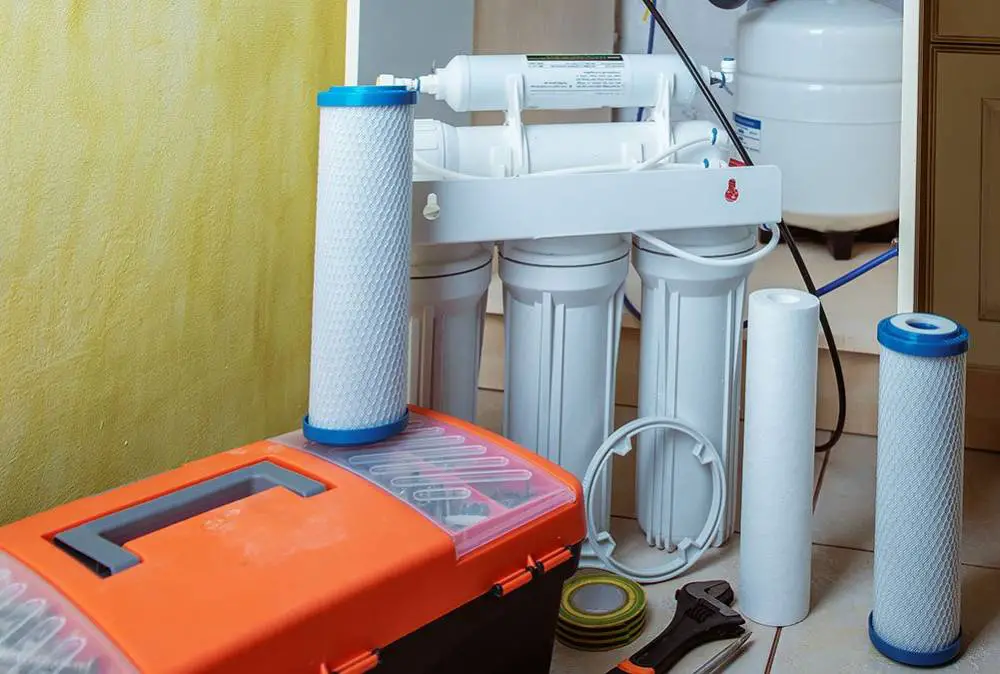
Types of Water Softeners
Salt-Based Water Softeners
Also known as ion exchange softeners, they’re the most common type in most households. They’re convenient for any type of household, from tiny homes to mansions.
The science behind it uses resin beads to exchange calcium and magnesium with sodium ions in your water, known as ‘ion exchange‘. Because of that, the water becomes neutral and is unlikely to damage your home appliances.
The disadvantage of salt-based water softeners is that they need to be maintained regularly, at least once a week. If the positively charged sodium ions run out, you need to recharge the resin with salt.
If you’re wondering if the salt added by the water softener will have any unfavourable effects, it’s usually too insignificant to notice. However, if you’re on a sodium-restricted diet, we don’t recommend drinking water from a salt-based water softener. Beyond that, a salt-based water softener won’t remove bacteria.
Salt-Free Water Softener
As the name suggests, this type of softener doesn’t use sodium ions to remove calcium and magnesium in your water. It doesn’t even get rid of the hard minerals in your water. Instead, it neutralises the hard water using template-assisted crystallisation.
How does a salt-free softener work? They prevent the calcium and magnesium present in hard water from sticking together and forming limescale; in doing so, the hard water won’t stick to your sinks, glasses, pipes, and showerheads.
On the downside, salt-free softeners are usually compact and smaller than salt-based softeners.
Magnetic Water Softeners
Similar to a salt-free softener, magnetic water softeners don’t remove the hard minerals in the water using resin beads but use a different method to neutralise the minerals. How do they work? They use a magnetic field to discharge the positive and negative ions from the minerals, so they will not bond together to create limescale.
We like magnetic water softeners because they’re easy to install; you don’t need to cut the water pipes. They’re also convenient for small spaces. However, most water softener systems with magnets need to be wired to a power supply.
Reverse Osmosis Water Softener
A reverse osmosis system uses a semipermeable membrane to remove water impurities at the microscopic level. During this process, minerals like magnesium and calcium are removed from the water before it is pumped out of the faucet. Since reverse osmosis systems can be used to purify and inject minerals for healthy drinking water, they’re technically a hybrid of water softeners and water filters.
However, these types of water softeners are designed to be installed under the sink and supply soft water to a single faucet. Then again, you can kill two birds with one stone.
How to Choose the Best Water Softener
Choosing the right water softener means considering the unique needs you have as a consumer. Here are some points to consider when choosing your water softener.
Capacity
First, you need to figure out how many particles your water softener can handle before the next salt replacement. If you live in a small house, RV, or apartment, you should consider small water softeners that have a grain capacity of between 16,000 to 32,000. But if you want a medium-size water softener, consider a unit with a grain capacity of between 32,000 to 64,000.
Anything beyond 64,000-grain capacity would be suitable for large households with high water consumption demand. Similarly, if you want a water softener for commercial or industrial purposes, we recommend a unit with a grain capacity of 80,000 to 100,000.
However, you should also choose the grain capacity of your water softener based on the hardness of your water. Which water softener would fit the bill? Just make sure you use a water hardness test kit to figure out how many grains per gallon can be found in the hard water supplied to your home. To be precise, hard water contains 7.5 grains per gallon; the higher the grains per gallon, the harder the water.
For instance, if the water supplied to your house contains 10 grains per gallon, and you usually consume 200 gallons of water every day, you should choose a water softener with a grain capacity of at least 14,000.
Here is an example of the calculation:
10 (grains per gallon) X 200 (daily consumption) x 7 (days in a week) = 14,000 grains. But just to be safe, we recommend you increase the grain capacity by 5,000. This means you will need a water softener with a grain capacity of 19,000 per week.

Size
Of course, you need to consider the size before you purchase a water softener based on the available space. For instance, if you live in an RV or tiny home, choosing portable or salt-free water softeners that don’t take a lot of space would make sense.
On the other hand, if you don’t want a headache during installation, we recommend magnetic water softeners; they’re also small and compact. But if you’re not concerned about space and consume a lot of water in your household, salt-based water softeners are convenient. Alternatively, you can consider a twin-tank water softener if you have a large household.
Regeneration Cycles
Most water softeners must be replenished when the salt runs out. If your water softener falls in that category, you usually have two options; a timed or a metered regeneration cycle.
A timed cycle is designed to replenish the salt automatically after a set-up time. The problem is, if you miscalculate how long it will take for the salt to run out, you could have too much salt wastage.
In contrast, a metered water softener will regenerate the salt on demand; that means the water softener will automatically detect when the salt runs out and only replenish when necessary. This could be a perfect water softener system if you’re away from your house.
Bypass Valve
If you want to water the lawn or garden, but you don’t want to overwork your water softener, a bypass valve will come in handy. If your water softener comes with a bypass valve, you can re-direct and access hard water at your convenience. This helps to prevent excess water usage in your household.
Multi-Purpose
Some water softeners have multi-purpose functionality; they don’t just remove the hard minerals but also purify the water for drinking. The best type of multi-purpose water softener you can get is a reverse osmosis system installed under the sink. However, it can be inconvenient if you want to install a unit for the entire house.
Certifications
If you want to purchase a water softener, you have to check if it’s certified by relevant organisations that test and approve the quality of a product. For instance, the best water softener systems in the UK are usually certified by the Water Regulations Approval Scheme or WRAS.
Some of the other certifications you should look out for include ANSI/NSF 44 (National Sanitation Foundation) and WQA (Water Quality Association).
Warranty
Another thing to consider if you want to predict the longevity of your water softener, take a look at the warranty offer. The most durable water softeners come with 5 to 7 years of manufacturer warranty.
Common FAQs
Is It Safe to Drink Water From a Water Softener?
It depends on the type of water softener. If you have a multi-purpose water softener unit and filter like the iSpring RCC7P-AK, you can drink the water that comes out. However, using resin beads, most water softeners that are only designed to replace calcium and magnesium with sodium ions don’t produce soft water that is safe to drink.
How Do You Clean a Water Softener?
Some of the best water softening systems for homes are designed to self-clean. But if you don’t have one of those fancy types, you can still clean it manually. First, you need to remove the water, salt, and brine grid out of the holding tank. Next, scrub the inside of the tank using warm, soapy water and rinse it.
We’re not done yet! You still need to pour a few gallons of water mixed with bleach into the tank so that you can kill any bacteria or microorganisms. After 15 minutes, remove the water and bleach mixture and rinse the tank thoroughly with plain water. Put back the brine grid, refill the tank with water and top up the salt.
Does Soft Water Damage Your Water Supply Pipes?
In comparison with hard water, softened water is unlikely to damage or clog your pipes at home. Despite that, it’s important to routinely inspect your water supply pipes for any signs of leaks; this is because soft water may leach minerals, especially from copper pipes, and it could gradually cause pinhole leaks.
Then again, if you’re using a water softener unit that neutralises the hard water without removing the minerals, it won’t affect your pipes.
How Long Do Water Softeners Last?
Some of the best quality water softeners have 10 to 20 years of life expectancy. However, life expectancy mostly depends on water usage and water hardness exposure. For instance, water softeners that frequently process extremely hard water have a shorter life expectancy than softeners that process hard water with fewer particles per gallon.
Choosing Your Water Softener
In a nutshell, if we had to choose the right water softener for extremely hard water, we would choose the Water2Buy W2B200. We recommend it because it can soften up to 1,250 litres of water in a single day. Not to mention, it can self-clean and automatically replenish the salt. For that reason, it could be the best water softener in the UK.
Otherwise, you can read through our water softener reviews to figure out the best option for your household.
Additional Resources
- Best Hot Water Dispenser
- Best Boiling Water Tap
- Best Kitchen Degreaser
- Best American-Style Fridge Freezer
- Best Kitchen Bin
Ian loves everything that revolves around the home improvement niche. He loves trying out new home appliances. He has also handled a lot of equipment and has a lot of insight. Plus, he’s worked on various home improvement projects that became a success.
If Ian isn’t busy working on his latest project, you can find him reading up about another one!
